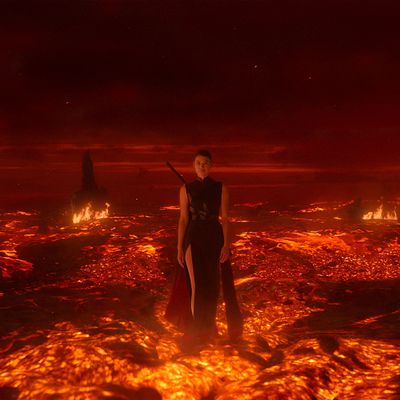
Up to this point in 3 Body Problem, easily the most interesting character has been Ye Wenjie: a woman who lived through the Cultural Revolution and, disgusted by humanity, sought salvation in the stars. So it’s a surprise that taking some time off from her story ends up working so well for “Destroyer of Worlds,” easily the most focused episode yet.
Of course, this is also an installment that spends a lot more time in virtual reality, so if you’re not vibing with the game sequences, you might be bored with all this. But it’s helpful to get several long sequences advancing through each level, ending with four. It feels more purposeful; in fact, by the end of the episode, we might be done with the game portion of this series altogether. It has accomplished its goal: slowly introducing both Jin and the audience to the plight of a civilization much different than our own.
But before we unpack that big reveal, let’s backtrack. At the beginning of the episode, the Oxford Five are discussing the suicide of a physicist at CERN who was found with his head submerged in a bathtub à la Jean Tatlock. He had the same shiny helmet as Vera Ye and other dead scientists, and once Clarence and Wade have their hands on it, they see it for what it is: a recruitment tool, assisted by a built-in brain-wave sensor and retinal scanner. The only question left is what they’re being recruited for.
When Auggie finds out Jin and Jack have been playing the game that potentially killed Vera, she snaps, forcing them to agree to stop playing. Maybe she has a point; Jin is clearly getting addicted, losing track of time and treating the game’s complex problems (like the literal three-body problem) as work instead of play. But Auggie still comes off as a little annoying and unreasonable, especially judging by Jin’s ability to put on a charming performance at dinner with Raj’s family.
There are a couple of characters in the Five who still aren’t totally connecting for me, and unfortunately, Auggie is one of them. (Will is another; Alex Sharp has decent chemistry with Jess Hong, but his cancer subplot feels very isolated from the main story compared to the others.) I like her friendship with Jin, and I find some of her story pretty effective, especially the horror of the countdown, which briefly and terrifyingly comes back to life when she fires up the lab again. I do sympathize with what she’s going through; there’s something especially haunting about her comment to Saul about understanding why scientists are killing themselves. But something still isn’t clicking, maybe because of the slightly wooden quality of Eiza González’s acting compared to Hong or maybe because of the sameness of her emotional reactions in the writing itself. She’s always lashing out, especially at Saul.
Luckily, Jin immediately breaks her agreement not to play the game, hopping into two-player mode with Jack to work through some of her theories. (How is two-player mode even possible, by the way? Just putting the helmet on at the same time with the intention of playing together gets you placed in the same server and civilization? I have a lot of questions about the online component of the game.) Jin manages to quickly complete level two by correctly proposing a new model: The planet belongs to a three-body star system. Chaotic eras, it turns out, come from the effects of three different suns’ gravitational fields acting on the planet.
Jin and Jack get together again to play level three, where they travel to Kublai Khan’s pleasure dome and witness the combined theories of Isaac Newton and Alan Turing. Newton’s invention of calculus plus Turing’s invention of the “Human Abacus” gets them closer to predicting the next long stable era but still fails in the absence of starting parameters for all three suns. When Jin speeds up time, and the three bodies eventually line up in syzygy, gravity inverts entirely, pulling a whole army up into the sky.
Part of the pleasure of these scenes comes from the spectacle, and there’s a lot in “Destroyer of Worlds,” beginning with the tri-solar day that arrives to engulf everyone in fire (including a horse) back on level two. The human-computer is also a marvel, with 30 million soldiers turning flags to black or white to represent ones and zeroes (though Liu Cixin’s book describes these manual calculations in far more detail). And the inverted gravity offers both horror and laughs, especially when Newton and Turing get chopped in half mid-air.
Jin completes level three by realizing that the object of this game isn’t to actually solve the three-body problem. It’s keeping the people alive, as demonstrated by the increasingly perturbed young Follower who keeps dying over and over. That breakthrough earns both Jin and Jack invitations to play level four under Tatiana’s supervision.
If you were getting sick of the apocalyptic scenarios, you’re in luck: This final level is basically just an info dump from Follower and Sword Lady (Sea Shimooka), credited as “Sophon” in the credits. Sophon acknowledges the truth: All civilizations on this game planet will end in a cataclysm, so the people’s only real solution is to take off in spaceships and find a new home. More importantly, though, the game planet is a real planet populated by real people facing certain extinction! Tatiana’s organization calls them the San-Ti (san ti ren = “three-body people” in Chinese). The aliens created the tech of this game to share their experience with humans, though the AI characters were only made to resemble humans to help with familiarity.
The San-Ti are on their way to Earth, though they’re four whole light-years away, and Tatiana seems insistent that people like Jin and Jack can help prepare the world for their arrival. She invites them to a summit to welcome them into the organization, but Jack leaves, unwilling to believe this isn’t just a scam. But Jin is intrigued, especially when Tatiana prods her into recalling the flood that once tore Jin from her home and drowned her parents in Hubei.
This new backstory for Jin is essentially her equivalent to Ye Wenjie’s experiences during and after the Cultural Revolution. Wenjie made a choice that changed the whole world because she’d seen humanity at its worst; now Jin is considering the same because she relates to the San-Ti on a personal level. I’m not sure this new character beat works as well, though. The first two episodes spent a lot of time developing Wenjie’s motivations, but Jin’s arc hasn’t touched much on her family trauma or any feelings of displacement.
“Destroyer of Worlds” isn’t a perfect episode, but by answering questions and devoting real time to the mysterious game at its center, it finally makes the present-day narrative compelling. It’s just a bummer we have to lose poor Jack, one of the few sources of comic relief in the show, punished for quitting the game with a brutal stab in the neck from Tatiana. But that sacrifice also helps clarify the stakes. This is no longer a bunch of stray narrative threads vaguely connected in mysterious ways. It’s one legible story about a race of extra-terrestrials that plans to conquer Earth — and, more importantly, the humans here who plan to help them by any means necessary.
Subatomic Particles
• “Shut the fuck up, troll.” — Isaac Newton
• Will calling Raj “death” and “chaos” reminds me of Albert Brooks calling William Hurt the devil in Broadcast News.
• Dinner with the Varmas offers another story of someone whose actions ended up changing the world: Raj’s father, who apparently tipped the balance of the Kargil War by singlehandedly killing a group of Pakistani soldiers and saving his own platoon. Maybe that story is lingering in Jin’s mind when she later considers her responsibility to the San-Ti.
• The scene of Mike Evans seemingly speaking to a representative of the San-Ti kind of comes out of nowhere without taking the time to acknowledge what it represents. Like, it says a lot that I’m confining the first example of direct, instantaneous human-to-alien communication to these ending observations.
• That being said, “A lack of fear leads to extinction. … Human must learn to fear again” goes pretty hard.
• I like the horror in this show, but I do wonder if Tatiana’s creepy horror-movie villain affect is the right choice tonally for this cerebral show. “All you had to do was keep playing” is a bit … needlessly spooky.


